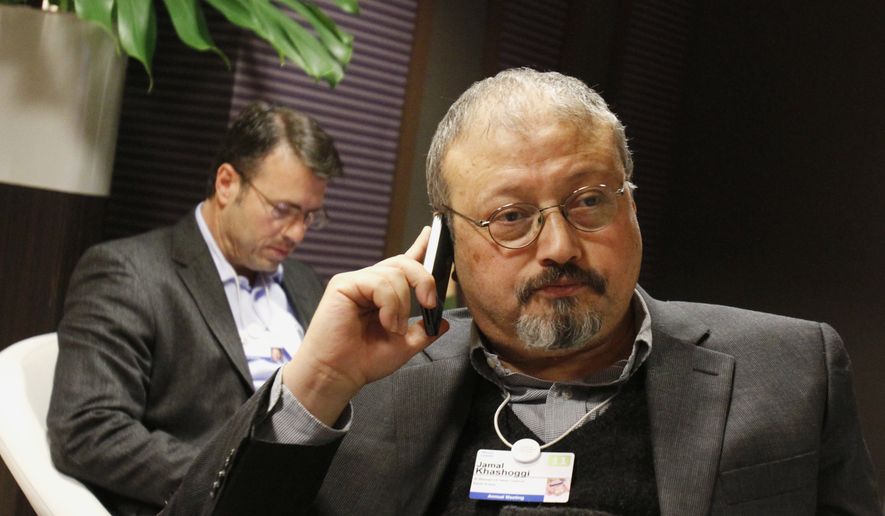Saudi Arabian prosecutors on Thursday indicted 11 men and said they would seek the death penalty for five who they say carried out the gruesome killing of dissident journalist Jamal Khashoggi, but the move did not dispel skepticism in Washington and across the region that the kingdom is failing to come clean about the death last month of the U.S.-based writer in Turkey.
The official statement in Riyadh implicated some members of de-facto Saudi Crown Prince Mohammed bin Salman’s inner circle but was released while the Saudi foreign minister was telling reporters that the crown prince had no role in the operation that killed Mr. Khashoggi and reportedly dismembered his body.
“Sometimes mistakes happen …,” Saudi Foreign Minister Adel al-Jubeir told a briefing in Riyadh after the charges were announced. “Sometimes people exceed their authority.”
Under pressure to show its displeasure with a critical ally in the region, the Trump administration took its most aggressive action against the kingdom to date, putting new sanctions on 17 Saudis it says assisted in the killing of Mr. Khashoggi, who frequently criticized the crown prince while living in self-imposed exile in Virginia.
Among those sanctioned was Saudi deputy intelligence chief Ahmed al-Asiri, whom Riyadh has blamed for authorizing the operation, allegedly without the crown prince’s knowledge or approval. Saudi officials say all of the figures named in the U.S. sanctions are already in custody as part of their internal investigation.
Making clear that the White House pins at least some blame on members of the Saudi regime, Treasury Secretary Steven T. Mnuchin said that those who “targeted and brutally killed a journalist who resided and worked in the United States must face consequences for their actions.”
Secretary of State Mike Pompeo said U.S. officials continue to seek all relevant facts and are working “with other nations to hold accountable those involved.”
“Our action today is an important step in responding to Khashoggi’s killing,” Mr. Pompeo said in a statement.
But Washington has walked a fine line in the Khashoggi case, given the central role Saudi Arabia plays in President Trump’s foreign policy — as a check against Iran, as a potential backer of an Israeli-Palestinian peace deal and as a critical player in global oil markets.
With his father, King Salman ailing, the hard-charging crown prince is widely acknowledged as the kingdom’s pre-eminent political force.
Turkey, which has repeatedly leaked key details of its investigation into the events of Oct. 2 at the Saudi Consulate, immediately dismissed the Saudi indictments as inadequate. Turkish President Recep Tayyip Erdogan has repeatedly called for the men to be prosecuted under Turkish laws. He said the killing and its cover-up were premeditated and must have been carried out by the highest levels of the Saudi government.
“They say [Mr. Khashoggi] resisted going back to their country and was killed,” Turkish Foreign Minister Mevlut Cavusoglu told reporters Thursday. “However, this murder was premeditated as we had announced before. The dismembering of the body is not an instant decision. They brought the necessary people and tools to kill him and dismember the body in advance.”
Anger on the Hill
On Capitol Hill, lawmakers from both parties clamored for the U.S. to punish Saudi Arabia, which has become mired even deeper in its largest foreign relations crisis since the 9/11 terrorist attacks.
Citing the Saudis’ continuously shifting explanations of the killing, Democrats welcomed the sanctions but demanded that Saudi officials provide a more “truthful and accurate accounting” of the incident, House Minority Whip Steny H. Hoyer, Maryland Democrat, said in a statement.
For weeks, Saudi officials claimed that the 59-year-old writer entered the Saudi Consulate in Istanbul on Oct. 2 to collect paperwork to marry his Turkish fiancee and that he died in a brawl with a group of Saudi officials who had flown into Turkey on private jets to meet him and try to persuade him to return to his homeland. Many have questioned why a mild-mannered writer would enter into such a lopsided fight.
“Strikingly absent from [Thursday’s] announcement are the people — or the person — who ordered the attack,” said Sen. Christopher Murphy, Connecticut Democrat and member of the Senate Foreign Relations Committee.
Sen. Rand Paul, Kentucky Republican and longtime critic of U.S. military support for the Saudis, dismissed the latest U.S. sanctions as essentially meaningless because they target Saudi “underlings” instead of those who ordered the killing.
Later Thursday, Mr. Paul waged an unsuccessful fight on the Senate floor against U.S. arms sales to Bahrain, a Saudi ally, as a symbolic protest against U.S. military ties to Riyadh.
“Opinion is changing over whether or not we should be arming Saudi Arabia,” Mr. Paul said. “They did some of it themselves by chopping up a dissident.”
Executives at The Washington Post, where Mr. Khashoggi was an opinion writer, demanded the launch of an independent investigation.
“From the start, the Saudi ’investigation’ has been an effort to shield those ultimately responsible for this heinous crime when there is every reason to believe that it was authorized at the highest levels of the Saudi government,” Post Publisher and CEO Fred Ryan said in a statement Thursday.
The explanation provided by Saudi prosecutors during a press conference in Riyadh included more official details of Mr. Khashoggi’s death. Saudi investigators now say he died after “a fight and a quarrel” that involved tying him up and injecting him with an overdose of sedatives. The Saudi team dismembered him.
Sheikh Shalan al-Shalan, the deputy attorney general, said the killing was ordered by an individual, whom he did not identify, but said that person was responsible for negotiating Mr. Khashoggi’s return to Saudi Arabia from Istanbul along with a 15-man team that was made up of negotiators, intelligence officers and logistics officials.
⦁ Dave Boyer, Gabriella Muñoz and Stephen Dinan contributed to this report.
• Dan Boylan can be reached at dboylan@washingtontimes.com.




Please read our comment policy before commenting.